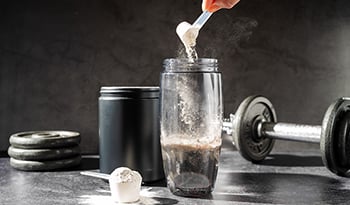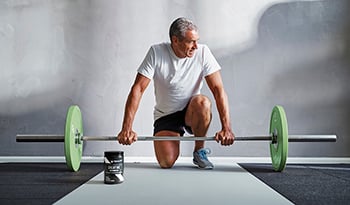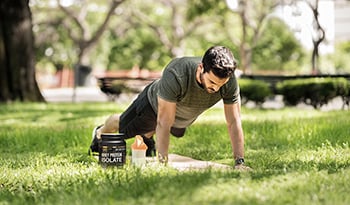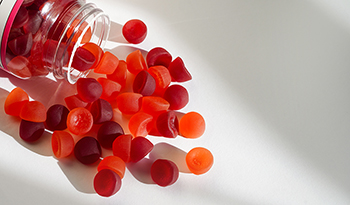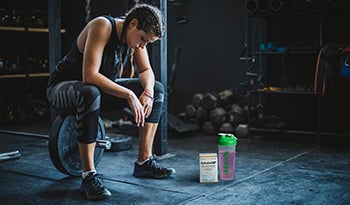3 Useful Supplements for High-Intensity Workouts

No matter what fitness level you are, if you like to train hard, then you need to be attentive to how you’re treating your body in and out of the gym. This means that you are training with intent and strategy, and you’re also fueling the body appropriately to recover and meet the demands needed for the activity you love to perform on a regular basis.
Things like sleep, nutrition, and supplementation are all worth considering when it comes to improving performance and recovery for high-intensity exercise. High-intensity training can be defined as many things. For example, high-intensity exercise could be defined as taking a class, performing circuit workouts, or just training super-heavy—all of these are high-intensity activities, but the way in which we define that intensity varies slightly.
It’s important that we recognize that not everyone is going to train the same way, so we need to individualize what we consume on a regular basis to meet our needs and optimize our performance. In this article, we’re going to focus on supplements for high-intensity workouts specifically. We’ll cover how to define intensity and three great performance high-intensity workout supplements worth exploring.
What Is High-Intensity Training?
In a workout setting, intensity is often defined as one of the means for how we gauge effort for a desired activity. It’s important to note that intensity’s definition can take different forms and it’s not just “high-intensity interval training” or HIIT. Thus, anything that requires a lot of scalable physical effort could be regarded as “high-intensity.”
When lifting weights, intensity could be defined as weight on the bar, so high intensity in a weightlifting setting would be heavier training for the day. In a “high-intensity” class setting, intensity is usually defined as the effort required to meet and match the metabolic demands set upon trainees in the class. For another example, if you’re an avid runner, then a higher-intensity training day could be defined as either a longer run that demands a lot of effort or a run that is focused on elevating heart rate.
None of the above ways of looking at intensity are inherently wrong and this is why it’s important to approach intensity as being dynamic and individual to one’s activity. Much like how intensity is dynamic in nature, so is the supplementation required for certain activities that are deemed high-intensity.
Supplementing for High-Intensity Activities
When it comes to supplementing for high-intensity activities and exercise it’s important to consider a couple of factors. These will be individual for everyone, but two questions to consider include:
What type of activity or workout is being performed?
This includes all the different forms of training and the ways we defined intensity as referenced above. Some factors to think about with this question include what your diet is like, how often you’re training, how long you plan on performing activities, and what your day-to-day is like in regard to how it could impact performance.
What area of performance are you trying to support? Pre-, intra-, or post-workout recovery?
This question entails how you envision the supplement supporting performance. By understanding this question, you can diligently decide what’s worth it and what should be skipped. Basically, this helps find the essentials for your needs.
The consideration of these questions will then help dictate what supplements could be useful for your workouts. The supplements below are broken into two sections: Pre-high-intensity exercise and post-high-intensity exercise.
Preworkout Supplements for High-Intensity Exercise
Caffeine
When it comes to tried-and-true supplements that help provide energy before high-intensity exercise, very few compare to caffeine. Caffeine is a central nervous system stimulant that is widely consumed to provide a boost to both the brain and the body.
In regard to high-intensity exercise, caffeine can be incredibly beneficial for boosting performance—however, it’s worth noting that there’s a fine line between workout support and jitters. This is why it’s important to understand personal tolerance and to choose supplements like pre-workout formulas and other supplements that include caffeine with attentiveness.
Caffeine and how it can positively impact workout performance has been pretty heavily studied over the last few decades. In fact, it’s generally accepted that caffeine is one of the pre-exercise supplements that can provide both a mental and physical boost to alter performance. More specifically, caffeine is what’s known as ergogenic, or a substance that is consumed to increase energy production and/or recovery.
Beetroot Juice
Another useful pre-high-intensity exercise supplement is beetroot juice. This supplement is less widely known than caffeine but is starting to build a pretty impressive resume for its potential benefits in supporting exercise. Beetroot juice has been suggested to increase blood nitric oxide concentrations due to its high levels of inorganic nitrates.
A review of beetroot juice published in 2018 in the Journal of the International Society of Sport Nutrition looked for trends from multiple studies that used beetroot juice to support performance in acute settings. Authors suggested that beetroot juice may play a role in the replenishment of the phosphocreatine resynthesis during repetitive exercise with short rest times, which could result in longer performances at higher intensities. Additionally, the authors suggested that beetroot juice might play a role in increasing power output.
Post-workout Supplements for High-Intensity Exercise
Protein
To likely no one's surprise, protein powder is on the list as a useful recovery supplement for high-intensity exercise. For those that train hard and often, recovery has to be a focal point of one’s day-to-day to ensure longevity in whatever activity is being pursued. Protein powder is an easy way to ensure one is consuming enough protein on a daily basis to meet protein needs and to support growth and recovery.
Protein plays a major role in how our muscles grow and recover. When performing any form of high-intensity exercise, whether it be on a weightlifting platform, in a class, or at your local track, then you’ll need protein following your workout to support recovery. Note: you don’t necessarily need to consume protein powder to recover and progress, but it’s one of the few supplements that’s easy to consume, bring with you, and can help be a “safe bet” when daily protein totals might be on the lower side.
Over the last few years, protein powder consumption in relation to resistance and endurance training has come attached with multiple messages. There are camps that say, “you need this immediately after a workout”, then there are others that say things along the lines of, “it’s not that important and you have a larger time frame than what’s been previously suggested following a workout.”
Neither is inherently wrong, but when taken at face value without the context of one’s situation, the language comes up short. A study published in 2018 in the Journal of Frontiers In Nutrition looked at how protein powder consumption affects recovery from resistance and endurance. The authors suggest that while the post-exercise window for protein consumption isn’t necessarily as short as many say (<1 hour), it’s also not ideal to not consume some form of protein and it can actually be disadvantageous, which bring us back to the idea above of this supplement being a “safe bet” for many.
While supplementation is a great way to support high-intensity workouts, it’s important to remember that supplements should complement—not replace—a nutritious diet. As always, it’s a good idea to talk to your doctor before adding to your daily supplement regimen.
References:
- https://www.ncbi.nlm.nih.gov/pmc/articles/PMC4213371/
- https://www.ncbi.nlm.nih.gov/pmc/articles/PMC5756374/
- https://www.ncbi.nlm.nih.gov/pmc/articles/PMC6142015/
DISCLAIMER:This Wellness Hub does not intend to provide diagnosis...
















































































 Table of Contents
Table of Contents





